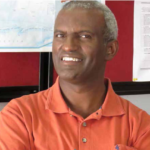East African missionary kids
By Worku Hailemariam
Wongel (Gospel) Zeleke, Wongel Mulugeta, William Cary, Ephrem Getachew—these are the names of some of our missionary kids (MKs) that represent the message of the gospel and the lives of missionaries. Through the names of their children, our missionaries remind themselves of their calling.

MKs often live in very multi-cultural, multi-lingual settings, and they can develop a deep sense of belonging to these communities. The presence of many languages at a young age can cause delays in schooling if mastery of the language of education is incomplete. However, fluency in these languages becomes a lifelong asset.
Preparing families and their kids for new fields is a challenge. It is vital for the sending church and mission to work together closely in the area of preparation, including expectations about the challenges ahead and how to tackle them together. In this way, some of the potential problems can be minimized. As it is, missionary families and their MKs are encountering challenges on both the sending and receiving sides—challenges that are emotional, financial, and social.
Language
African MKs are typically expected to speak a minimum of three languages. MKs from our Ethiopian context speak Amharic, our national language. In addition, they learn the ethnic language of their parents; an international language such as English, French, or Arabic; and finally, the national language of the country of service, such as Urdu or Chinese. In some cases, an ethnic language from the country of service is also added. Parents often prefer to use their ethnic language between them but use English or a local ministry language with their kids. However, others prefer to teach their children the parents’ ethnic language.
On one hand, children exposed to three or more languages during their early years will more easily acquire additional languages. On the other hand, in the short-term, the presence of so many languages can cause delays in education because mastery of the language of education is incomplete.
Cultural challenges

Every missionary expects to live in a foreign culture, but the mixed culture of the multi-national missionary community can be a surprise. In some fields, the kids join very diverse communities with no clear minority or majority culture. However, in most places the African MKs are a minority ethnically and culturally. This dynamic can pave the way for loneliness and isolation, as reflected by an MK’s comment when his family returned to their home country for ‘home assignment’, “We wish to stay in our country so that we can have more friends here.”
Education
Lack of finances is always the primary issue in children’s education. A common expectation of the sending church and the extended family of the missionaries is that MKs will be able to access higher quality education outside their home country. They assume that wherever the mission serves, good schooling is available. However, this is not always the reality. A second assumption from the sending church is that the cost of children’s education is manageable. However, this is also not the reality.
While on one hand, missionaries struggle to pay for their children’s education; on the other hand, churches are truly struggling to add any more financial support. As a result, missionary parents carry the additional burden of finding ways to raise needed funds for their kids, an overwhelming endeavor that can cause worries and distress.
African missionaries are not familiar with home schooling and home schooling is often not recognized in their country.
Despite the high cost of doing mission work, especially children’s education, I can testify that some African churches are supporting their missionaries with great sacrifice. They are not supporting according to how “affordable” it is for them. Rather, as Paul puts it in 2 Corinthians 8:3: “For I testify that they gave not only what they could afford but far more, and they did it of their own free will.” I have seen that some of the supporting churches, though their church buildings are in poor condition and there are other priorities, are devoted to giving first priority to missionary support.
All of this said, as we have made field visits to missionaries sent from our East African Office, we have observed amazing potential and resiliency among our MKs. Some may become missionary pilots, cross-cultural ministers, and teachers of other MKs. We could produce a second generation of missionaries.

Worku Hailemariam is the Director of SIM’s East African Office in Addis Ababa, Ethiopia, serving since 2012. This office mobilises, orients, and sends missionaries from East Africa to serve across the globe. Ethiopian churches have been sending missionaries since the 1990s.
